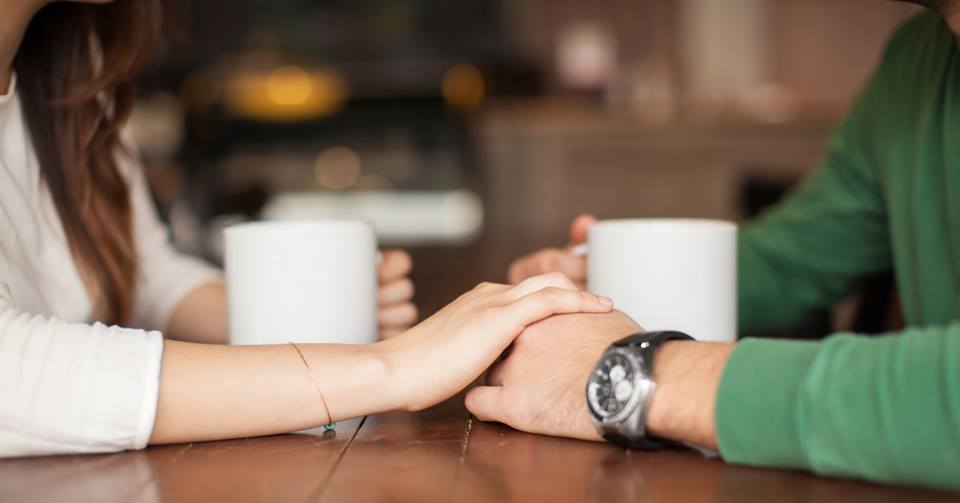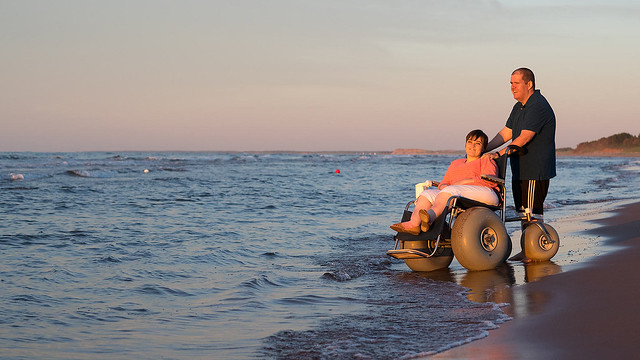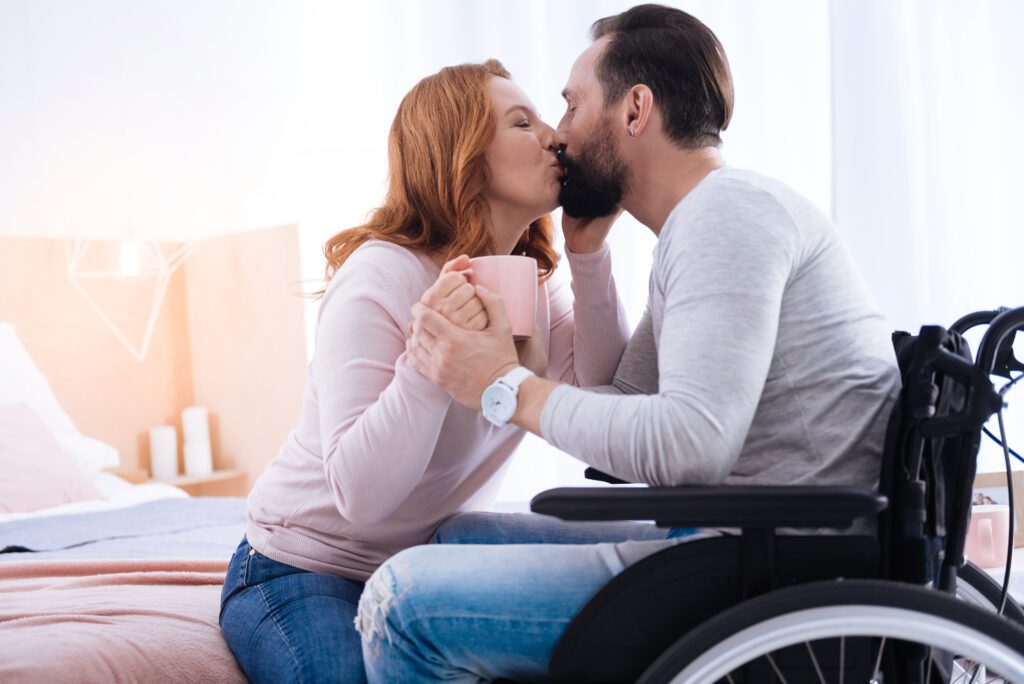Life can be busy with tons of priorities… work, kids, friends, school, medical/healthcare needs, caregiving, volunteering, advocating, oh and your relationship too. Sometimes we’re so scheduled with demands that we fail to include time for much-needed self-care. It’s often undervalued but self-care benefits the mind, body and soul. Interestingly enough, the same concept of self-care can apply to our relationships. Just as we care for ourselves, couples who commit to some TLC may boast individual and collective benefits that’ll help to keep (or improve) a healthy connection and, ultimately, enhance the minds, bodies and souls of both partners in the relationship.
There are so many facets of relationship building. You’re familiar with common self-care practices for personal gain, so simply shift those ideas to a twosome approach.
Here are 30 self-care rituals for all couples – able-bodied, interabled and disabled:
For Your Minds
1. Get Back to Nature.
Countless studies have concluded that nature is good for overall health. There are plenty of couple activities to enjoy outdoors. Think about energetic options, like adventuring within an accessible state or national park, and also more calming options, like picnicking. To explore a new self-care ritual together, try earthing (also known as grounding — a word that perfectively describes this literal practice of using the ground to figuratively stay grounded). On your next romantic picnic, kick off your shoes and let your bare feet stabilize on the electron-enriched earth. Feel the breeze on your bodies and gaze up to peacefully cloud-watch. Scientists believe that earthing reduces chronic pain, inflammation and blood pressure, while increasing energy levels and sleep quality.
FYI, the National Parks Service (NPS) has several pass programs that grant access to more than 2,000 federal recreation sites across the nation. Check out the Access Pass, a FREE, lifetime pass available to U.S. citizens or permanent residents that have a permanent disability.
2. Try Tandem Meditation.
Meditation tops self-care lists for many. It’s an excellent exercise centered on relaxing the mind and finding clarity. Perhaps you perceive meditation to be a solo thing, but it doesn’t have to be. Try sitting in a traditional lotus position in alignment with your partner by facing each other with your knees touching, sitting side-by-side, sitting back-to-back or any position to feels comfortable to your bodies. Maybe hold hands or position your hands over each other’s heart to feel the beat and breath. There’s actually a guided practice called Love-Kind Meditation, by The University of California Berkeley, which works really well for couples. It includes suggested phrases to recite to one another, such as “May you live with ease, may you be happy, may you be free from pain.”
3. Unplug to Plug In.
Reboot yourself and your relationship by powering down! We’re all guilty of allowing mobile devices to distract our attention. A Time magazine article titled “How Your Smartphone is Ruining Your Relationship” addressed how smartphones can be a romance killer. It stated, in part, that people who were more dependent on their smartphones reported being less certain about their partnerships; and people who felt that their partners were overly dependent on their devices said they were less satisfied in their relationship. Yikes! Make an effort to be present with your partner and not focused on a cell screen. Whether at the dinner table, on the couch or on date night, try switching your phone to airplane mode or turn it off altogether to avoid disruptive notifications of social media and email.

4. Stretch Beyond Your Comforts.
Routine can be good, and necessary in some aspects, but too much consistency can put us in a rut. To keep your relationship fresh, be open-minded to trying new things. For instance, stray from the typical date night dinner-and-a-movie combo. By holding off on your stall go-to, you’ll get a taste of new experiences and eat up fresh connective opportunities. Here is an idea: Make a date night jar inclusive of ideas that stretch beyond your comfort zone.
5. Minimize Your (Online) Social Circle.
It’s wonderful to have a large circle of friends. However, thanks to social media, we stay connected to people who, unfortunately, bring negativity into our lives. Think about it: How many times have you read a post – political, religious, disability-focused, etc. – that rubbed you the wrong way and, thus, shifted your mood or mindset? That’s happened to me and I ended up talking in a less than positive light to my partner. Ugh, why waste a conversation on negativity? Encourage one another to limit that negative energy by ‘unfollowing’ certain people on social media. When you do this, you’ll remain ‘friends’ on the platform but won’t see their posts. Additionally, plenty of articles (see Psychology Today) outline how social media can hurt a relationship.
6. Read a Book.
Personally, the perfect self-care afternoon is curling up on the couch with a good book, a fuzzy blanket and a hot cup of coffee. I can easily integrate my partner. We could read a book aloud to each other, perhaps relationship-focused, romantic poetry or some random fiction just for fun. Or, we could listen to a book on tape or a podcast.
7. Set Goals.
Self-care isn’t just about manicures and bubble baths. Challenging yourself and challenging your partner is definitely a form of self-care! Studies show that we’re more likely to achieve goals when aided by the help of another. That doesn’t just apply to a workout buddy… that supportive approach can apply to any goal, whether personal or collaborative. And isn’t your partner your best support person? When one partner sets a goal, be mindful to encourage his/her/their efforts. That can mean participating or just offering reassuring words. Also, consider establishing couple-specific goals to achieve together. You’ll be able to work as a team and experience a shared self of accomplishment. Talk about relationship building!
8. Take Your Time.
Grant yourselves permission to slow down, enjoy the simple things and, in turn, enjoy each other’s company. With the hustle and bustle of life, we tend to look for shortcuts but, sometimes, the long and slow road is better. How about this… On your next couple’s road trip, take a beautiful scenic road rather than the congested highways which can put you in a bad mood. Back roads have a way of bringing couples back to meaningful conversation too.

9. Conquer the To-Do List
Set yourselves up for success through organization and honesty! There are personal to-do lists and shared to-do lists. For personal efforts, I’ve learned that I respond better to old-school written checklists. When I just set a Google calendar appointment for myself with time blocked for a to-do item (like call the doctor’s office to book an appointment or something), I tend to easily hit snooze or push back the date. Once I physically write out a list and leave it on the counter, the in-your-face visual reminder is effective and I get it done. It feels good to literally cross something off my list with a pen. I have started making written lists with reminders for my husband too and, funny enough, he also gets more done this way. So simple, yet effective! Regarding implementing this further in our relationship, there have been times when I’ve felt that I’ve asked my husband to do something (insert any chore) a million times and he puts it off. That creates negative energy between us because I get annoyed. He starts to feel that I am nagging and I start to feel resentful that I have to nag him. To avoid this, I strive to be direct and sometimes share with him why I think something is a priority and help him set a timeline. Once I’ve expressed myself clearly, he has a better understanding of the reasoning behind my ask and understands that I’m not just nagging. We’ve better communicated, appreciated each other’s perspectives and conquered the to-do list.
10. Clean House.
Freshen things up as it can do much more than tidy up your physical space. Decluttering can help you improve organization and, thus, improve functionality within your home. Plus, a clean space makes you happier. Seriously! Sure, nobody is thrilled to tackle chores but nobody likes a huge pile of clothes wasting space in the closet or a stockpile of expired cans in the pantry either. Cleaning, of course, helps to eliminate germs. Wouldn’t you rather use your bed together for something else rather than be in bed with a germy cold? You can make cleaning fun if you do it together, I swear. Crank the tunes and have mini-dance parties or singing sessions in between sweeps and wipes.
For Your Bodies
1. Pamper Together.
Perhaps your daily cleansing regimen is just washing your face, but self-care of one’s body can and should go way beyond that. Ladies, if you think your guy won’t be up for pampering, you may be wrong. Think of the laughs you’ll have as you paint goopy facial masks on each other. And pedicures are lovely for everyone’s tootsies. Run a warm bath for a rejuvenating soak. Incorporate salt rubs, oils and body lotions. Your bodies will get clean and silky smooth which is an invitation for lovey-dovey time.
2. Support Personal Self-Care Pampering Too.
Sometimes the best way to treat your partner is to allow him/her to indulge in whatever self-care ritual brings him/her joy. We’re talking basics here. For example, I love to stand in a hot shower for a long time. I mean practically scorching, room completely filled with steam and so long that the water heater runs out. Yup, I have some sensory quirks. My husband knows that those ten minutes are my feel-good escape (especially since we have young children with special needs and I am likely covered in some sort of kid-caused yuckiness). He splurges a bit on hair care. I think he overpays for haircuts and styling products but, alas, it’s his favorite self-care thing so I just offer compliments of his well-groomed locks.
3. Be Workout Buddies.
Physical fitness is an essential part of healthy living and, if applicable, adaptive equipment and gyms are available. Since you’ve committed to a life together, collaborate on exercise-focused self-care to achieve optimal health. This is important as some people with disabilities can find it more difficult to eat healthily, control their weight and be physically active. Your partner makes your heart skip a beat and, so, incorporate cardiovascular exercises to work your hearts! These things can make for great dates, such as dancing, biking or however you like to get your sweat on. On the flip side, since healthy relationships are all about balance, don’t forget to explore yoga, stretching and relaxing practices.

4. Add Color to Your Life (and Plate).
How we choose to fuel our bodies is another self-care consideration. Isn’t it beautiful to see a rainbow in the sky while cloud-watching with your love? Well, strive to “eat the rainbow” with your partner too. That means a bright meal featuring diverse hues, rather than a bland brown and white dish (yup, meat and potatoes won’t cut it). Different nutrients are found in different colored vegetables and fruits. For example, orange/red (i.e. sweet potatoes, carrots) provides beta-carotene which is converted into vitamin A; and green (i.e. broccoli, spinach) delivers fiber and vitamin C. And in an effort to stay hydrated, use the same approach with water consumption by infusing H2O with berries, cucumber and citrus fruits.
5. Inhale a Soothing Scent.
Aromatherapy uses essential oils distilled from various plants. According to the Mayo Clinic, it stimulates “smell receptors in the nose, which then send messages through the nervous system to the limbic system ─ the part of the brain that controls emotions.” Studies have shown that aromatherapy might reduce anxiety, depression, headaches, pain (especially for people with kidney stones or osteoarthritis), and also improve sleep and quality of life. Vanilla is believed to be arousing, lavender is soothing and peppermint can stimulate. Use candles or an essential oil diffuser to let aromatherapy naturally put you in great moods.
6. Be Intimate.
During sex, oxytocin is released which promotes more restful sleep. Science aside, I can attest that my husband can achieve snore status pretty quickly post-rendezvous! Sex can boost positive emotions because, well, it feels good to be desired. Some couples, able-bodied and interabled alike, even schedule sex to ensure that this self-care ritual happens often. This can be helpful for partners that have a catheter (or prefer extra prep time).
7. Sleep Together.
OK, this time we’re talking about actually snoozing. Sleep… seems like such a simple thing but most Americans aren’t catching enough zzz’s. There are tons of benefits to being well-rested, such as increased productivity and a stronger immune system. Instead of staying up for another episode during a Netflix binge, crawl into bed together and sleep.
8. Have a Cup (or Two).
Coffee makes couples happy… literally. Forgo decaf because caffeine has been shown to trigger the production of dopamine in the brain and, thus, trigger cheeriness — a lovely ingredient indeed. Plus, café dates are easy and delish.

9. Give (and Receive) a Massage.
Finding time to unwind with your partner without worries flooding your mind is tricky. Schedule a couple’s spa day to indulge in professional massages, which usually come with other amenities like access to a sauna, steam room and lounge. This type of TLC is amazing, right? In between spa splurges, give each other massages at home to work out kinks and strive for chill status.
10. Be Gentle.
Gentle touches are ways to offer love and show that you care. Intimate embraces don’t have to be reserved for the bedroom. I’m not talking major PDA, but rather subtle touches of affection. Hold hands, hug, give sweet kisses on the cheek or forehead, caress his/her/their arm, etc.
For Your Souls
1. Laugh Together.
Laughing stimulates hormones called catecholamines which in turn release endorphins that positively aid happiness and relaxation. Laughter really could be the best medicine! And benefits include stress reduction, muscle relaxation, lowered blood pressure and strengthened immune system. Find ways to laugh when alone and when together. Comedic entertainment is an option but go further by talking about funny memories you’ve made together.
2. Write it Out.
The practice of releasing and recording feelings, memories and the likes can be fulfilling and helpful in many ways. For example, the trend of ‘gratitude journaling’ helps users realize and appreciate life’s gifts that might otherwise be taken for granted. Journaling is often a solo practice, yet couples journaling is a way for partners to document their love stories and deepen their relationship in the process.
3. Go Solo.
Being a part of a loving duo is wonderful, but it’s totally fine (and maybe even crucial) to snag solo time now and again. Schedule something that makes you feel happy and nourishes your soul. Read a book in the park, spend the day focused on your hobby, stroll a museum, etc. Connecting with your partner is one priority, but so is reconnecting with yourself. When you reunite, you’ll be in a great mood which, of course, is contagious.
4. Cuddle.
Researchers say cuddling is highly beneficial. Snuggling up will again release oxytocin and promote overall happiness. For personal care, you can wrap yourself in a cozy blanket and nap. I love my weighted blanket! Therapeutic weighted blankets, wraps and lap pads may especially benefit people with autism, sensory processing disorder, ADHD, hyperactivity and other disabilities. They provide gentle pressure to produce a calming and relaxing effect. And cuddling with your loved one can improve your connection through non-verbal communication and intimacy. So assume the spooning position!

5. Do Good to Feel Good.
Volunteerism, activism or the act of doing something good makes us feel good and improves our mental state. How cool is it that a selfless act can be a self-care opportunity?! Spend time with the person you love doing do-good and feel-good date activities. There are countless ways to make a difference within the disability community and beyond.
6. Check In On Emotions.
You likely ask your partner simple questions, like “How was your day?” Take your interest further and allow each other to express emotions without judgment. Author and mindfulness coach Kristen Manieri shares how two questions make all the difference in her relationship: What would you like to be acknowledged for? What would you like me to know about your life? And for some couples, attending counseling sessions is a way to stay in a positive state before problems arise.
7. Ask for Help.
Some perceive asking for help as a sign of weakness but it’s really a sign of strength. It’s great to push aside the fear of judgment and involve others when you need a hand. Cut yourself some slack! No one is perfect and everyone has different strengths so another person may be better suited to advise on the issue at hand. Plus, healthy relationships are all about the balance of give and take. Sometimes needs are met via 50-50 participation and other times one steps up a bit more, especially if caregiving is a factor. Your partner is the person you trust most so feel comfortable asking for help when needed. I’ve learned that if I want it done “right” (aka the way I would do it), I need to be direct and specific with my husband. He approaches things differently than me and he certainly can’t read my neurodiverse mind so asking for help and effectively communicating go hand-in-hand. People like feeling useful and your partner will likely not reject your request.
8. Be Adventurous and/or Travel.
Self-care is about finding ways to take care of yourself and that includes identifying what makes you happy. New adventures and exciting life experiences are just that. Odds are you aren’t going to achieve your bucket list if you’re living a couch-potato existence. Allow your mind (or minds to include your partner) to grow through travel, for instance. The wonders of our world are sure to impact your mind, body and soul. On vacation, incorporate downtime into your agenda. I have a tendency to overschedule which increases my stress and, thus, defeats the goal of a relaxing trip. FYI, AirBnB recently improved its accessibility search features.
9. Pray.
Opening one’s heart to a higher power through prayer or spirituality can be powerful. Have you heard the statement “couples who pray together stay together?” A study conducted by the National Survey of Religion found that people in same-faith relationships and partners who attended services regularly were more satisfied with their relationship, according to HuffingtonPost.
10. Make Date Night a Routine!
You may already consider your relationship to be happy and loving, but there’s always room for improvement. Funny enough, your date night can work as a self-care ritual. Countless studies have proclaimed date night as beneficial, like the Date Night Opportunity report published by the National Marriage Project at the University of Virginia. It found that regular date nights add value to relationships by generating “higher levels of communication, sexual satisfaction and commitment” among couples.
Did we leave out a ritual that works for you and your partner? Tell us what other self-care rituals are on your list!
Want similar content? Read:
- Why Interabled Relationships are the New Normal
- Love Match! Dating Websites for People of All Abilities
- Therapist Offers “Sexpert” Advice to People of All Abilities
A portion of this article originally appeared on DateNightGuide.com.






